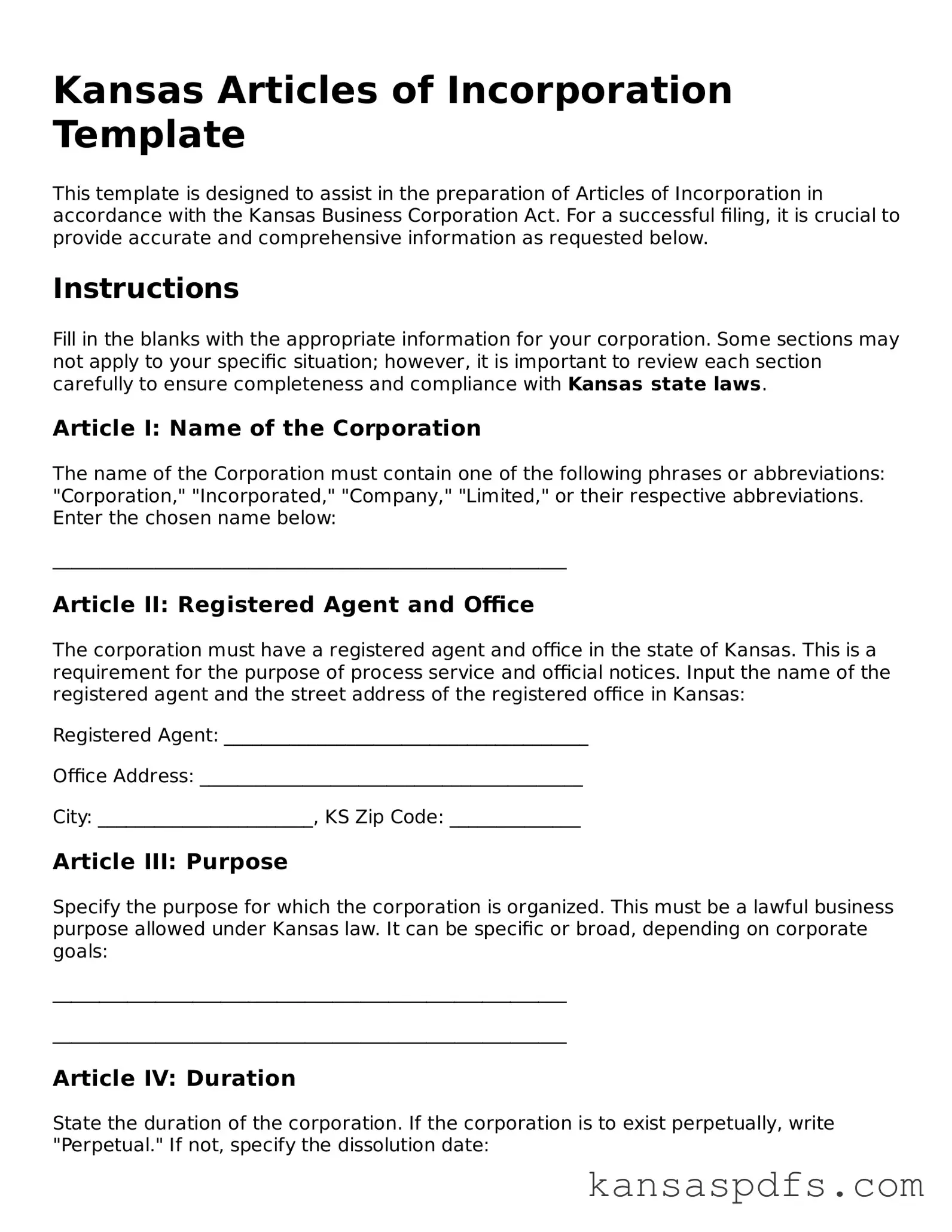Kansas Articles of Incorporation Template
This template is designed to assist in the preparation of Articles of Incorporation in accordance with the Kansas Business Corporation Act. For a successful filing, it is crucial to provide accurate and comprehensive information as requested below.
Instructions
Fill in the blanks with the appropriate information for your corporation. Some sections may not apply to your specific situation; however, it is important to review each section carefully to ensure completeness and compliance with Kansas state laws.
Article I: Name of the Corporation
The name of the Corporation must contain one of the following phrases or abbreviations: "Corporation," "Incorporated," "Company," "Limited," or their respective abbreviations. Enter the chosen name below:
_______________________________________________________
Article II: Registered Agent and Office
The corporation must have a registered agent and office in the state of Kansas. This is a requirement for the purpose of process service and official notices. Input the name of the registered agent and the street address of the registered office in Kansas:
Registered Agent: _______________________________________
Office Address: _________________________________________
City: _______________________, KS Zip Code: ______________
Article III: Purpose
Specify the purpose for which the corporation is organized. This must be a lawful business purpose allowed under Kansas law. It can be specific or broad, depending on corporate goals:
_______________________________________________________
_______________________________________________________
Article IV: Duration
State the duration of the corporation. If the corporation is to exist perpetually, write "Perpetual." If not, specify the dissolution date:
Duration: ______________________________________________
Article V: Capital Structure
Detail the total number of shares the corporation is authorized to issue. If there are multiple classes of shares, provide the number of shares authorized for each class and describe the rights, preferences, privileges, and restrictions of each class:
Total Authorized Shares: ______________________________
- Class A: ___________________________________________
- Class B: ___________________________________________
- Class C: ___________________________________________
Article VI: Incorporators
Provide the name and address of each incorporator. An incorporator is someone involved in the formation of the corporation and is responsible for signing the Articles of Incorporation:
- Name: ______________________________________________
- Address: ____________________________________________
- City: __________________, KS Zip Code: _______________
Article VII: Board of Directors
List the names and addresses of the initial directors who will serve until the first annual meeting of shareholders or until their successors are elected and qualified. If not yet determined, state "To be elected at the first annual meeting of shareholders.":
- Name: ______________________________________________
- Address: ____________________________________________
- City: __________________, KS Zip Code: _______________
Article VIII: Indemnification
State whether or not the corporation will indemnify its officers, directors, employees, and agents against liabilities and expenses incurred in connection with litigation in which they may be involved by virtue of their position. If so, specify the extent and conditions of such indemnification:
_______________________________________________________
Filing Instructions
Once completed, review the Articles of Incorporation for accuracy and completeness. The document must be filed with the Kansas Secretary of State along with the appropriate filing fee. For the latest filing requirements and fees, please refer to the Kansas Secretary of State's website or contact their office directly.
Legal Notice
This template is provided as a general guide and is not intended to serve as legal advice. It is advised to consult with a qualified attorney to ensure compliance with all relevant Kansas laws and regulations.

